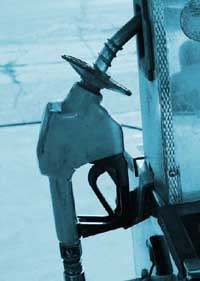Gas stations attacked amid anger over Iran's new fuel rationing
Angry Iranians attacked several gas stations in protest after the government suddenly began long-threatened fuel rationing, while many others rushed to fill their tanks.

The Oil Ministry announced the start of rationing Tuesday night only three hours before it was due to begin at midnight. The sudden announcement sparked long lines at stations as Iranians tried to get one last fill-up before the limitations kicked in.
Several stations were attacked "by vandals," state radio reported early Wednesday. It did not say how many stations were damaged or give details.
The Iranian government has planning for weeks to implement rationing in an attempt to reduce the billions of dollars a year it spends in fuel subsidies. On May 21, the government reduced the subsidies, letting gas prices rise 25 percent. It was supposed to begin rationing at the same time, but the move was repeatedly put off.
The issue is enormously sensitive in this oil-rich nation, where people are used to having rock-bottom gas prices. Hard-line President Mahmoud Ahmadinejad came to power in 2005 election based largely on his promises to improve the faltering economy. But his failure to do so has sparked widespread criticism.
Iran is the second biggest exporter in the Organization of Petroleum Exporting Countries. But because it has low refining capability, it has to import more than 50 percent of its gasoline needs. To keep prices low, the government subsidized gas sales, saddling it with enormous costs.
Under the rationing plan, owners of private cars can buy only 100 liters (26 gallons) of fuel per month at the subsidized price of 1,000 rials per liter (0.074 euros/liter, 38 U.S. cents/gallon). Taxis can get 800 liters (211 gallons) a month at the subsidized price.
Conservatives in Iran's parliament, especially those aligned with the country's national oil company, have long pushed for higher gasoline prices with the hope of curtailing demand and freeing up government spending to invest in more oil and gas production.
Still, Ahmadinejad has resisted allowing increases because of his campaign promises to share Iran's oil wealth with the nation's poor. Iran has a law that says gasoline prices must increase 10 percent every year, but the president has resisted efforts by parliament to reverse a 2005 decision to suspend the annual increases.
Subscribe to Pravda.Ru Telegram channel, Facebook, RSS!


